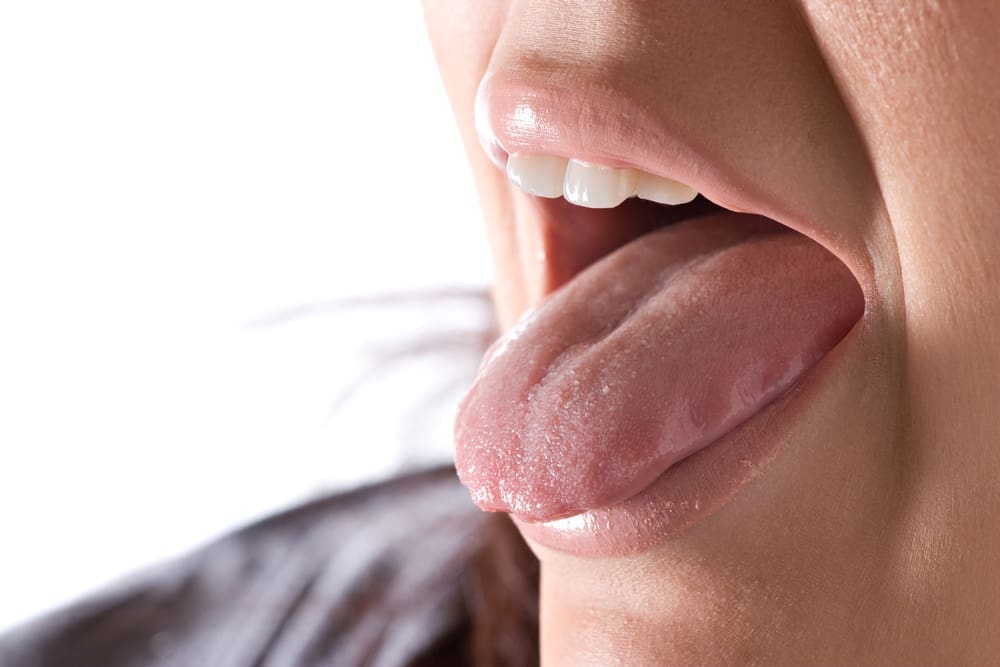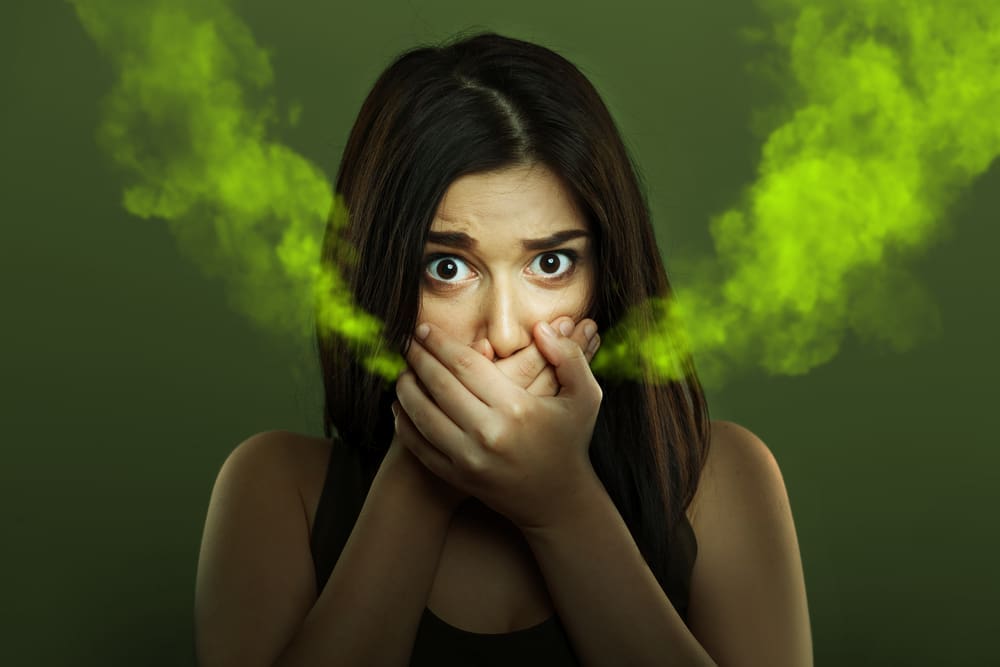If you’ve ever had a conversation with someone who has bad breath, you know how unpleasant it can be. Bad breath can be embarrassing and make social interactions uncomfortable. But what causes bad breath, and more importantly, how can we prevent it? Today, we’ll explore the causes of bad breath, different treatment options, and ways to prevent bad breath from happening in the first place.
What is Halitosis?
Halitosis, commonly referred to as bad breath, affects many people. In fact according to the Mayo Clinic, “most of us occasionally have bad breath.” Halitosis can also be a sign of more serious health conditions and should not be ignored. Most cases are caused by oral hygiene issues or dental problems such as gum disease or tooth decay, but halitosis can also be a symptom of other health conditions, such as diabetes, liver or kidney disease, respiratory tract infections, and even cancer.
There are many different treatment options available for those suffering from bad breath. Some common treatments include practicing good oral hygiene habits, eating a healthy diet low in sugar and processed foods, chewing sugar-free gum to stimulate saliva production, and using specialized mouthwash or oral rinses. For more serious cases, seeing a dentist or doctor may be necessary in order to determine the underlying cause of the halitosis and work towards treating it effectively.
Why Do I Have Bad Breath?
The most common causes of bad breath are poor oral hygiene habits, health conditions like gum disease or tooth decay, and consuming certain foods or drinks. Oral hygiene issues such as plaque buildup on teeth, decaying food particles trapped in the mouth, and dry mouth can all contribute to bad breath. Additionally, certain medical conditions like diabetes, liver disease, kidney disease, respiratory infections, and cancer can all cause bad breath symptoms.
What Causes Bad Breath
We all want our breath to be fresh and pleasant, but sometimes bad breath (halitosis) can be a problem. There are many different causes of bad breath, but the most common culprit is bacteria. When these bacteria build up in your mouth, they release sulfur compounds that cause that characteristic foul odor.

Other causes of bad breath can include:
Oral hygiene
While there are many possible causes of bad breath, one of the most common is poor oral hygiene. When food particles and bacteria are allowed to build up on the teeth and tongue, they can lead to an unpleasant odor. Additionally, if plaque is not removed regularly, it can harden into tartar, which is much more difficult to remove and can also cause bad breath. Thankfully, bad breath caused by poor oral hygiene is usually easy to fix; simply brushing and flossing regularly can make a big difference.
Dental problems
While most cases of bad breath are temporary and caused by things like eating certain foods or breathing through your mouth, there are also many cases that are the result of more serious dental problems. In particular, dental issues like cavities, gum disease, and tooth decay can all contribute to bad breath. This is because the bacteria that causes these dental problems thrive on dead tissue or decaying food remnants left behind in the mouth. Additionally, this bacteria often produces a smelly sulfur compound that not only contributes to bad breath but can also indicate an infection in the mouth. Therefore, it is important to address any underlying dental problems in order to eliminate bad breath for good.
Poor Diet
Did did you know that a poor diet can be one of the main causes of bad breath? When we eat sugary or processed foods, the bacteria in our mouths feed on the sugars and release gas. This gas then gets trapped in our mouth and nose, causing bad breath. In addition, certain foods like garlic and onions can also cause bad breath. The oils from these foods can stay in our bodies for up to 24 hours, and these oils are very difficult to remove with brushing and flossing alone. So if you’re looking to freshen your breath, try eating more healthy fruits and vegetables, and cut back on sugary and processed foods.
Medical conditions
Most people are familiar with the unpleasant feeling of waking up with “morning breath.” This is caused by the natural process of saliva production slowing down during sleep, allowing bacteria to accumulate on the tongue and release foul-smelling gases. However, morning breath is usually nothing to worry about and can be easily remedied with a quick brush of the teeth. Bad breath that persists throughout the day, however, could be a sign of a more serious medical condition. For example, gum disease and tooth decay are both common causes of chronic bad breath. In addition, certain diseases such as diabetes and liver failure can also lead to persistent bad breath.
Tobacco products
There is no doubt that tobacco products such as cigarettes, cigars, and chewing tobacco can cause serious health issues for users. In addition to increasing the risk of heart disease, cancer, and stroke, these products are notorious for causing bad breath. This is because tobacco contains many compounds that produce foul odors when they interact with bacteria in the mouth. These compounds can easily coat teeth and gum tissue, causing a buildup of plaque-causing plaque and contributing to a buildup of bacteria in the mouth. Over time, this reduces the amount of oxygen available to plaque-containing cells, creating an even more toxic environment.
So if you want to keep your breath fresh and clean, it’s best to avoid tobacco products altogether. Not only are they bad for your overall health, but they can also make your breath stink!
Dry mouth
Dry mouth, or xerostomia, is a condition that is characterized by a persistent feeling of thirst and the inability to produce enough saliva. While having a dry mouth may not seem like a big deal, it can actually have some significant negative impacts on your overall health. One of the most common side effects of dry mouth is bad breath or halitosis. This is because saliva is necessary to help cleanse the mouth and remove food particles and bacteria, which are key contributors to bad breath. Without sufficient saliva production, bacteria can build up in your mouth, causing inflammation and a pungent odor. Additionally, without adequate saliva production, your teeth may also be more prone to cavities and gum disease.
Alcohol consumption
Many people know that drinking alcohol can lead to bad breath, but few people are aware of the exact cause of this problem. At its core, alcohol consumption reduces saliva production in the mouth, which leads to a dry mouth and reduced ability to clean away bacteria. These bacteria then produce noxious odors that can emanate from the mouth when someone is drinking. Over time, alcohol consumption can also weaken the immune system and make it difficult for the body to fight off harmful bacteria that might be present in the mouth. Thus, for those looking to prevent or eliminate bad breath caused by alcohol consumption, staying hydrated and maintaining good oral hygiene is key.
Stress
While there are many possible causes of bad breath, one of the most common is stress. When we’re feeling stressed, our bodies go into fight-or-flight mode, which can cause a number of changes. One of these changes is an increase in the production of cortisol, the stress hormone. Cortisol has a number of effects on the body, one of which is to decrease saliva production. Saliva is important for keeping our mouths healthy and clean, so when we produce less of it, we’re more likely to experience bad breath. In addition, stress can also lead to dry mouth, which can further contribute to bad breath. So if you’re struggling with bad breath, try to relax and de-stress. It might just be the key to fresher breath.

Do I Have Bad Breath?
Whether you realize it or not, bad breath is a common problem that affects thousands of people worldwide. If you are worried that you might have bad breath, there are a few telltale signs to look out for. One of the most obvious is if people keep backing away whenever they get close to you, or if they are constantly holding their hand up to their nose as though they can’t stand the way you smell. Additionally, bad breath can lead to poor self-confidence and social withdrawal, so if you notice that your mood seems especially low or listless, it could be a sign that your breath stinks.
At the end of the day, however, the only real way to know if you have bad breath is to do an honest self-check. Pay attention when talking to others and see how they react – if there’s any lingering uneasiness in the air after your conversation ends, then there’s a good chance you might be suffering from halitosis. But don’t worry – there are plenty of easy and effective ways to deal with bad breath, from using mouthwash and gum daily to avoiding certain food items that can worsen the problem. So don’t let your worries about whether or not your breath is offensive get you down – there are solutions out there, and with a little effort, you can have fresher breath in no time.
How to Get Rid of Bad Breath in 8 Tips
- Brushing your teeth regularly is one of the best ways to keep your breath smelling fresh and clean. When you eat, food particles and bacteria can become lodged in your mouth and tongue, causing bad breath. By brushing immediately after meals or snacks, you can remove these harmful substances and leave your mouth free of foul odors. Additionally, regular toothbrushing helps to prevent plaque buildup, which can cause even more serious problems like gingivitis, cavities, and tooth decay. So if you want to keep bad breath at bay, be sure to brush your teeth after every meal for a healthy smile and fresh breath!
- It may seem obvious, but flossing at least once a day is one of the most essential steps you can take to get rid of bad breath. Flossing helps to dislodge stubborn food particles that tend to get stuck in your teeth, and it also removes dead skin cells that can accumulate along the surface of the gums. Additionally, flossing helps stimulate blood circulation in your mouth, which promotes fresh breath by eliminating odorous bacteria from the crevices and cavities between your teeth. So if you want good breath all day long, make sure to floss at least once a day! Your dentist will thank you for it too.
- Brush your tongue! This may sound simple enough, but it is one of the most effective ways to get rid of bad breath. When food particles and bacteria sit on the surface of your tongue, they generate a noxious odor that can be quite unpleasant. However, if you regularly brush your tongue with a soft-bristled toothbrush or tongue scraper, you can eliminate that foul smell and keep your breath smelling fresh all day long. And best of all, it’s a quick and easy process – just spend a few seconds each morning gently scraping away at the surface of your tongue and you’ll be good to go! So why wait? Grab that toothbrush and start brushing away the bad breath today. Your loved ones will thank you for it.
- When it comes to bad breath, there are a few commonly-mentioned culprits, including things like poor oral hygiene and certain foods. But one often-overlooked cause of bad breath is unclean dentures or other dental appliances. Whether you wear a partial plate, an orthodontic retainer, or some other type of dental device, it’s important to take good care of these items in order to avoid chronic bad breath. This means cleaning them regularly, both by hand and with the help of specialized cleaning products. Additionally, you should seek the advice of your dentist if you notice any signs of infection or other problems with your dentures or dental appliances. Taking good care of your teeth and mouth is essential for keeping bad breath at bay – so don’t forget about your dentures or dental appliances!
- When it comes to bad breath, one of the most important things to remember is to stay hydrated. Dry mouth can lead to a build-up of bacteria in the mouth, which in turn produces that tell-tale smell of halitosis. By drinking plenty of water throughout the day, you can help flush out any lingering bacteria and keep your breath smelling fresh and clean. Making sure that you enjoy a diverse and balanced diet is also essential for keeping bad breath at bay. Foods high in fiber, such as leafy greens and cruciferous vegetables, can be especially beneficial for promoting healthy saliva production and for helping your body to digest any food particles that may remain in your mouth after eating. So if you want to avoid dry mouth and get rid of bad breath for good, follow these simple tips!
- If you’re looking to get rid of bad breath, you may want to take a closer look at your diet. Certain foods, such as onions and garlic, can cause bad breath by affecting the sulfur levels in your mouth. Other foods, like coffee and alcohol, can contribute to dry mouth, which can also lead to bad breath. To help keep your breath smelling fresh, make sure to stay hydrated and brush your teeth regularly. You may also want to consider chewing sugar-free gum or mints after meals. By making a few simple changes to your diet, you can enjoy fresh-smelling breath all day long.
- Getting regular toothbrush replacements is one of the most important steps that you can take to keep bad breath at bay. As your toothbrush becomes increasingly used, it naturally accumulates bacteria and debris from your mouth that can lead to unpleasant odors. By regularly replacing your toothbrush, you not only avoid this buildup of bacteria, but you also ensure that your oral care routine remains effective. In addition, rotating through different toothbrushes means that you have new brushes with fresh bristles each time, which ensures a thorough and consistent cleaning every time. So if you’re looking to kick bad breath to the curb, be sure to get a new toothbrush on a regular basis!
- If you’re looking to get rid of bad breath, the best place to start is with regular dental checkups. Regular cleanings and exams with your local Yuma Dentist will help to remove bacteria-ridden plaque and other hardened food particles that can become lodged between your teeth. These often odoriferous materials are prime breeding grounds for foul-smelling bacteria, which can lead to bad breath over time. By scheduling regular appointments with your dentist and maintaining good dental hygiene at home, you can ensure that your breath stays fresh and clean. So don’t wait any longer – set up a checkup today and breathe a little easier!
Bad Breath Treatments
Luckily, there are also a number of treatments available to help eliminate and prevent bad breath. Some simple strategies include brushing your teeth regularly and chewing sugar-free gum after meals. In addition, you can try rinsing with mouthwash or using special lozenges or mints formulated to fight odor-causing bacteria in the mouth. Ultimately, the best way to deal with bad breath is to address the underlying cause by seeking medical attention when necessary and practicing good oral health habits every day. With a little bit of care and attention, you can keep your breath fresh and your smile healthy for years to come!
If you are interested in treating your bad breath, contact Dr. Carroll at our Yuma, AZ dental office for a consultation. Call (928) 504-0639 or schedule an appointment today!
LOCATION (TAP TO OPEN IN GOOGLE MAPS):


